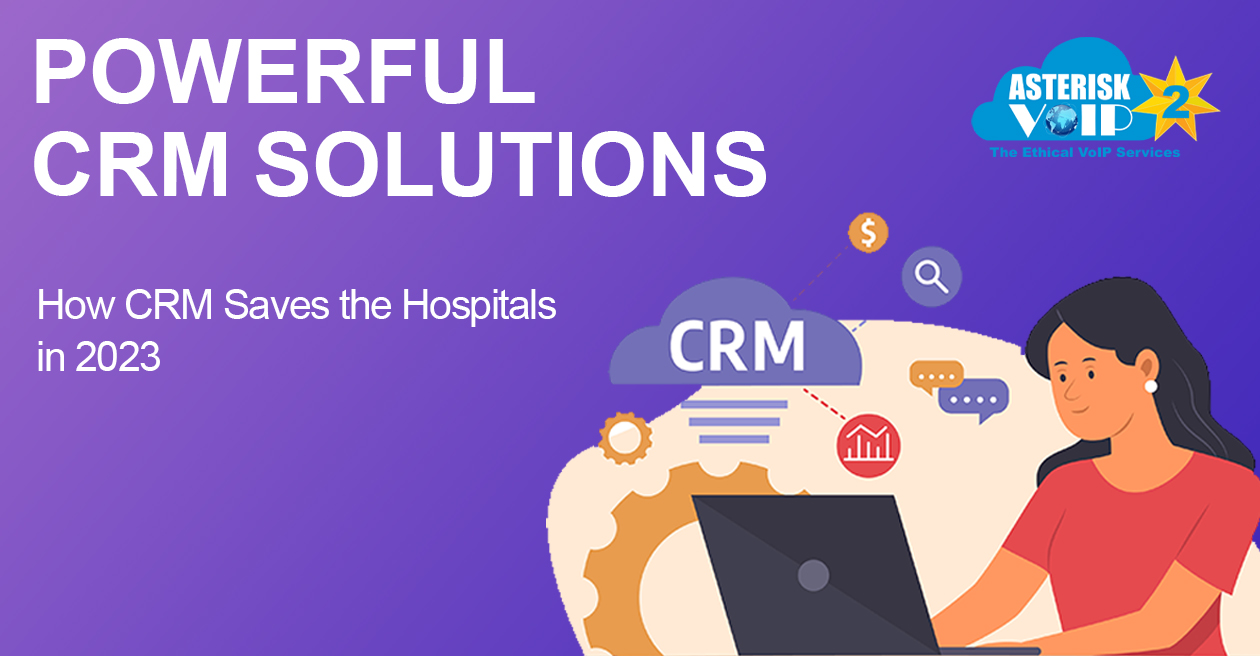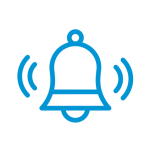How CRM Saves the Day in Hospitals| 2023

In the fast-paced world of healthcare, hospitals face numerous challenges in delivering efficient and personalized patient care. That’s where Customer Relationship Management (CRM) systems come to the rescue.
In this blog, we will explore how CRM, in combination with the Asterisk2VoIP service, can revolutionize hospital operations and enhance the overall patient experience.
What is a CRM?
CRM stands for Customer Relationship Management. It refers to a system or software that enables businesses to manage and nurture their relationships with customers and prospects. A CRM system helps organizations streamline their sales, marketing, and customer service processes by centralizing customer data, interactions, and communication in one place.
The primary goal of a CRM is to enhance customer satisfaction, improve customer retention, and drive business growth. It provides a holistic view of customer interactions, enabling businesses to understand their customers better, anticipate their needs, and deliver personalized experiences. CRM systems typically offer functionalities such as contact management, lead tracking, sales pipeline management, customer service ticketing, and reporting and analytics.
Features of CRM
Here are some common features found in CRM systems:
Contact Management
CRM systems provide a centralized database to store and manage customer contact information, including names, addresses, phone numbers, email addresses, and social media profiles. This feature allows businesses to maintain accurate and up-to-date customer records.
Lead Management
CRM systems assist in capturing and tracking leads throughout the sales process. Businesses can store lead details, assign ownership, track lead sources, and monitor lead progression, enabling effective lead nurturing and conversion.
Sales Pipeline Management
CRM systems offer tools to manage and visualize the sales pipeline. Sales representatives can track opportunities, forecast revenue, set reminders, and prioritize activities to efficiently move leads through the sales stages.
Interaction Tracking
CRM systems allow businesses to record and track customer interactions across various channels, such as email, phone calls, meetings, and social media. This feature ensures a complete history of customer engagements, enabling personalized communication and better customer understanding.
Email Integration
CRM systems often integrate with email platforms, enabling businesses to send and receive emails directly within the CRM interface. This integration streamlines communication, provides email tracking, and allows for centralized email history.
Task and Activity Management
CRM systems enable businesses to assign and track tasks, appointments, and follow-up activities. This feature helps teams stay organized, prioritize tasks, and ensure timely actions for efficient customer engagement.
Reporting and Analytics
CRM systems offer reporting and analytics capabilities, allowing businesses to gain insights into customer data, sales performance, marketing campaigns, and customer service metrics. These insights help identify trends, measure success, and make data-driven decisions.
Workflow Automation
CRM systems provide automation features to streamline repetitive tasks and workflows. Automated workflows can trigger actions based on predefined criteria, such as sending follow-up emails, assigning tasks, or updating records, reducing manual effort and improving efficiency.
Customer Service and Support
CRM systems often include ticketing or case management features to track and manage customer service requests. Support teams can log issues, assign ownership, track resolution progress, and maintain a comprehensive view of customer support history.
Integration Capabilities
CRM systems can integrate with other business applications, such as marketing automation software, accounting systems, or e-commerce platforms. This integration allows for seamless data flow and eliminates the need for manual data entry across multiple systems.
How CRM can revolutionize hospital operations
Streamlining Patient Information Management
A CRM system integrated with Asterisk2VoIP enables hospitals to efficiently manage patient information. From contact details and medical history to appointment scheduling and follow-up reminders, the CRM centralizes all relevant data. This streamlined approach eliminates the need for manual record-keeping, reducing errors and ensuring accurate and up-to-date information is readily available to medical staff.
Enhanced Communication and Collaboration
Effective communication is vital in any hospital setting. With Asterisk2VoIP service and CRM integration, hospitals can unify their communication channels, including voice calls, video conferencing, and messaging.
Doctors, nurses, and support staff can easily connect with each other, ensuring seamless collaboration and rapid response times. This improved communication contributes to better coordination among healthcare professionals, leading to enhanced patient care.
Efficient Appointment Management
Managing appointments efficiently is a critical aspect of hospital operations. CRM systems enable hospitals to automate appointment scheduling, reminders, and rescheduling. Patients can receive notifications via SMS, email, or phone calls, reducing no-shows and optimizing the utilization of resources.
With the Asterisk2VoIP service, hospitals can integrate their call center operations into the CRM, enabling staff to handle appointment-related inquiries and provide personalized assistance.
Personalized Patient Care
A CRM system equipped with detailed patient profiles empowers healthcare providers to offer personalized care. By accessing patients’ medical history, preferences, and past interactions, doctors can tailor treatment plans, medication, and follow-up care accordingly. This level of personalization builds trust between patients and healthcare providers, ultimately improving patient satisfaction and outcomes.
Efficient Service Recovery
In case of any service-related issues or complaints, a CRM system allows hospitals to effectively track, manage, and resolve patient concerns. By logging and analyzing patient feedback, hospitals can identify recurring issues, implement corrective measures, and prevent future occurrences.
The Asterisk2VoIP service integrated with CRM facilitates efficient call logging and routing, ensuring that patient concerns are promptly addressed, and a high level of customer service is maintained.
Conclusion
a CRM system is a powerful tool that helps businesses manage and nurture their customer relationships effectively. In the fast-paced and high-pressure environment of hospitals, CRM systems, coupled with the Asterisk2VoIP service, emerge as essential tools to streamline operations and elevate patient care.
By centralizing patient information, enhancing communication and collaboration, optimizing appointment management, personalizing patient care, and ensuring efficient service recovery, CRM systems revolutionize hospital operations and contribute to a superior patient experience.
Ready to embrace the power of CRM and Asterisk2VoIP for your hospital? Contact us today to learn more about our consulting services and how we can help you integrate these technologies seamlessly into your healthcare organization.

